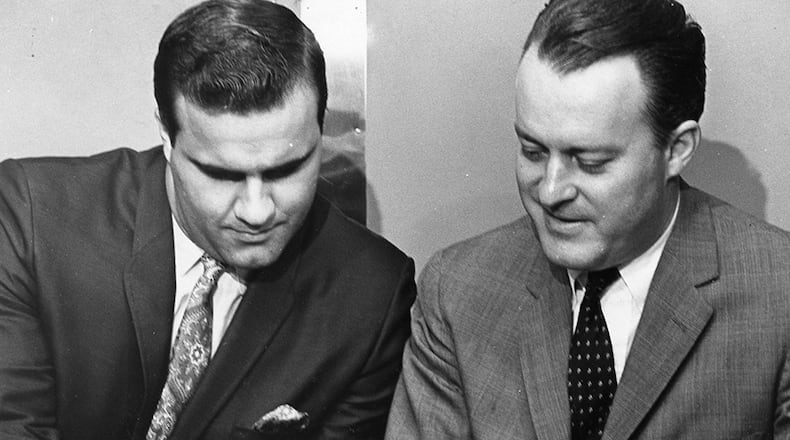Ours is a time when things viewed as givens – health, the freedom of movement, the availability of toilet paper – are givens no longer. We also live in a city where the ability to follow a big-league team is taken as a birthright. If you were born here before April 12, 1966, it wasn’t.
Bill Bartholomay, who died Wednesday at 91, changed that. The baseball team he moved here from Milwaukee made us a major-league city. By then, the advent of a first-tier sports franchise was inevitable – indeed, the Braves wanted to start playing here in 1965 but were blocked by an injunction, and Rankin Smith had been awarded an NFL franchise on June 30, 1965 – but you're not big-league until you're playing big-league games. The Braves made that a reality.
The sports map of these United States pre-1965 bears no resemblance to today. Back then, you could draw a line westward from Washington D.C. to Cincinnati to St. Louis: South of that line and east of the Mississippi, there was no big-league team in any sport. Extend the line to San Francisco, and only three metropolitan areas had such franchises – Los Angeles/Anaheim, Dallas and Houston.
Metro Atlanta’s population broke 1 million in 1966, the year the Braves and Falcons began playing. Within 10 years, it was 1.43 million. By 1988, it was 2.05 mil. That didn’t happen just because we had big-league teams. (The Hawks arrived from St. Louis in 1968; the Flames set up shop in 1972.) Our airport and Coca-Cola were massive drivers; so was our weather. But being able to check the standings in any sport and see “Atlanta” in all of them helped rebrand a city that some folks knew only from David O. Selznick’s “Gone with the Wind.”
Bartholomay's group bought the Milwaukee Braves from Lou Perini in 1962. From the start, that group was looking to relocate. As Bartholomay told the AJC in 2015: "Frankly, we thought it was a very great opportunity for baseball, 100 years after Reconstruction, to kind of lead professional sports on a regular-season basis into the southeastern part of the United States."
This much must be said, though: As big as Atlanta getting a baseball team was, Atlanta wasn’t immediately certain how to feel about it. Nobody down here had grown up rooting for these guys. They won the National West in 1969, but by the middle ’70s they were a bad team that couldn’t draw flies. (Or, this being the South, gnats.) In 1975, the year before Bartholomay sold the club to Ted Turner, attendance was 534,672.
Said Terry McGuirk, who started working for Turner in 1973 and is today the Braves’ chairman: “Bill took an awful lot of heat for moving – there were lawsuits in Milwaukee and two extra years of work – and getting a team was a huge accomplishment for leaders of Atlanta. They were able to bring and attract a major-league team. But the going was pretty difficult the first several years. We’d never had a team, and we didn’t know how to react to it.”
Then: “The last year before he sold it, they were in tough financial shape. You could drive up and park in the first row and go sit anywhere.”
>> Baseball world remembers Bill Bartholomay
Once the Braves were his, Turner put them on TBS 150 times a year. For much of the ’80s, the Braves were among the most-followed team in the land, even if home attendance didn’t reflect it. In the ’90s, when the Braves finally got and stayed good, Atlanta’s enthusiasm for the club finally met the interest stirred by basic cable.
Said McGuirk: “Nobody had ever put a lot of games on TV. This Petri dish was like any startup – it was rocky; there was a lot of experimentation; it was a brave new world. Bill lit the fuse and started it off and handed it off.”
Bartholomay sold the Braves, but he never left the Braves. He was their chairman until 2003, their chairman emeritus after that. He’d show up – he lived in Chicago – at big games, and sometimes at not-so-big games. Known as Mr. B, he bore a striking resemblance to Bob Hope, and not the Bob Hope who was once the Braves’ PR chief.
McGuirk: “Not only did he look like Bob Hope, he acted like Bob Hope. He was a swashbuckler. He lived life to the fullest. I told somebody yesterday, ‘He lived an outsized life.’ He would fly and cross oceans to be where the action was.”
His last direct contact with the Braves came in February at North Port, Fla., the team’s new spring training home. Said McGuirk: “We have an annual dinner before the first spring workout, and we bring the executive group together. Snit (manager Brian Snitker) and (general manager) Alex (Anthopoulos) were there, and Bill came. He shouldn’t have been there, but he came.
“He’d had terrible pneumonia. He was on a walker, and he could barely talk. He gave a few remarks, what his voice could allow, and then he just listened. We were perplexed at how to get him back to the hotel. He had to will himself to do this, almost as if he knew it was the last one.”
Bill Bartholomay wasn’t from Atlanta, but he changed Atlanta. He was, McGuirk said, “the nicest, kindest, most gentlemanly person,” and this non-Southern gentleman did a great service to the capital of the New South. He brought us the Braves.
About the Author
The Latest
Featured



